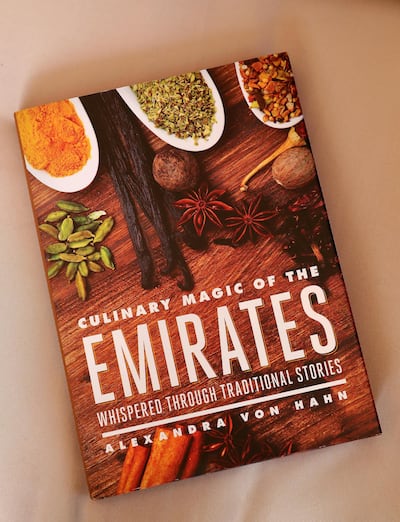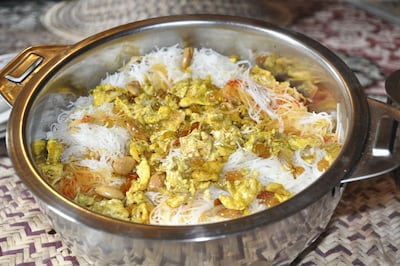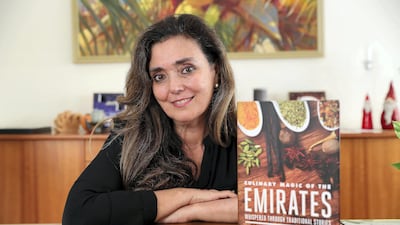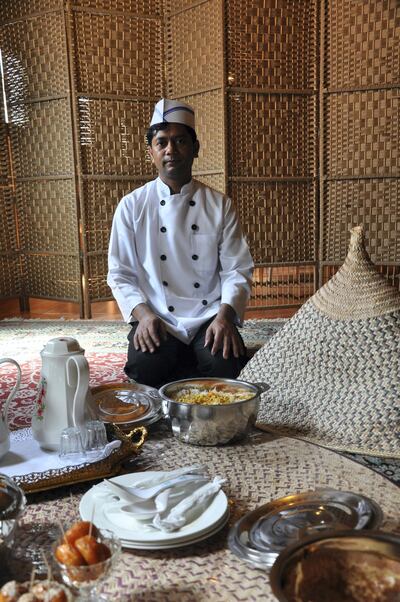Alexandra von Hahn has always been fascinated by food. Not just cooking it, and certainly not just eating it, but mostly what it says about society, and where the traditions that surround cuisine stem from. Von Hahn hosted free workshops on the food of the UAE for interested residents, and explained how the recipes and food habits of the country fit into the values and cultural norms of Emirati society. She did that for five years from her home in Abu Dhabi, while living there with her German diplomat husband, and continues to do that today across Germany.
“I’ve always just been so interested in food and what it says about society, and I certainly wasn’t going to live for five years in the UAE without learning all I could about Emirati food culture and history,” she says.
Then, she decided to take things one step further, and embarked on what she calls “the biggest project of love” of her lifetime: gathering the stories and recipes of Emirati women from across the UAE, to write a book that would reflect her love for all the recipes she had so admired for years.

A labour of love
The result is von Hahn's first cookbook, Culinary Magic of The Emirates – Whispered Through Traditional Stories (Dh165), published by Motivate and launched at the Sharjah International Book Fair last month. "The Emiratis have shown me that tradition is what makes a meal special," she writes in her book's preface, and it is her quest for understanding local traditions that lead to the book even existing in the first place.
Marrying a German diplomat meant that von Hahn – a Canadian of Baltic, German and Hungarian descent who spent the first 11 years of her life in Chile before settling in Montreal – got to live all over the world. It is her time spent in Abu Dhabi, however, during her husband's tenure at the German embassy that allowed her to fall in love with the food and spices of the Arab world and choose to finally pursue her passion for the food of the region. She put her business on hold – she was running the Canadian Cheesecake franchise in Germany – and took a break from working as a holistic relationship coach. And instead, she began knocking on her neighbours' doors.
"After just a few months living in Abu Dhabi, I was slowly and surely falling in love with Emirati food and so curious about everything. For example, why do Emiratis sit on the floor to eat traditionally? Why do they eat with their hands? Why do they serve their coffee in such a specific way to their guests? So many questions, and I needed Emiratis to answer them," she explains.
Meeting the neighbours
At the time, she was living in Al Bateen, close to the Corniche, in a neighbourhood that is predominantly filled with Emirati families. She began going door-to-door to introduce herself to her Emirati neighbours, inviting the women to her own home and asking them about their lives and their cooking. "We got to know each other," she says. "They saw how interested I was, and started inviting me more and more. That's how I met my closest neighbour, Zahra Al Nahdi, who is also featured in my book. She said she would help me understand the food culture and values, on the condition that I turn all the stories and recipes that I gather into an Emirati cookbook."
Beginning with Al Nahdi, von Hahn met and interviewed 25 women and two men – a mix of home cooks and professional chefs, such as celebrity chef Khulood Atiq, from across the UAE. These are the ones who feature in the book with their recipes, but all in all, the author conducted over 150 interviews to gather all the knowledge and background she needed to write. The project took her more than three years to complete, and an additional six months spent in Germany testing all the recipes. She even enrolled in a professional photography course to be able to take photos during her research – all the photos in the book were taken by her.
"These women wanted this book to happen," says von Hahn. " They all have children, some very young, some who are above 30, and they said that there isn't a single book out there for their children to go to, to read about their traditional dishes and the stories behind Emirati food.
“The women I interviewed agreed to this because they really wanted to pass on their food values and their food culture to future generations. The book is about who they are and what they wanted me to write.”

Von Hahn credits befriending renowned artist and jewellery designer Azza Al Qubaisi as the bridge that allowed her to enter Emirati homes. Al Qubaisi acted as the translator and accompanied the author on her visits.
“We went from home to home, in Fujairah, in Ajman, all over. Women would put us in touch with other women and our network grew. I even went from cafe to cafe to ask Emiratis I met there if they loved cooking, and wanted to talk about cooking with me,” she explains.
Uncovering Emirati values and traditions
The stories she had compiled are written descriptively and with an almost reverent respect; von Hahn is able to weave in traditional tales and explanations of habits while explaining a recipe or detailing the history of a specific ingredient or spice. But perhaps most importantly, she delves into values like the importance of eating together as a family, or sitting on the floor to be more grounded with the earth, or the ritual of serving coffee to guests, in an attempt to understand Emirati culture and the connection between food and traditions. Interestingly, as well, there's more than one recipe for some dishes. Lgeimat, for example, is made in different ways, as is Emirati coffee. There's even a section dedicated to using camel milk – and camel meat – as an ingredient.
"One thing I noticed, for example, is that food is never simply wolfed down. It's meant to be celebrated and honoured. In order to appreciate food, families sit on the floor in a circle and eat with their hands. This allows them to touch, smell and taste the food, making mealtimes a sensory experience. Food isn't meant to stuff our stomachs and make us lethargic after a meal. One way to prevent overeating is to sit with one leg tucked under yourself and the other one pulled up against your stomach. Some of these habits even go back to the Prophet Mohammed and how he used to eat; the Emiratis emulate him in how they live their lives. It's a blessing to do so and it is fascinating to hear them explain it," says von Hahn.
After the book was published, she went back to visit every woman and man she had interviewed, to gift them a copy of the book. "I wanted to show them that I really had done what I promised them I would do," she explains.
“I fell in love with this country, and I wanted this to be my gift to the UAE.”
Find The Culinary Magic of the Emirates by Alexandra von Hahn (published by Motivate) at Kinokuniya, Magrudy's and Borders outlets across the UAE, as well as the duty free kiosks in the airports, for Dh165
_________________________
Read more:
Eight of our favourite karak spots in the UAE
Spoilt for choice: the UAE's growing love affair with Latin American food
Winter warmers: the power of comfort food and the recipes to try
__________________________



